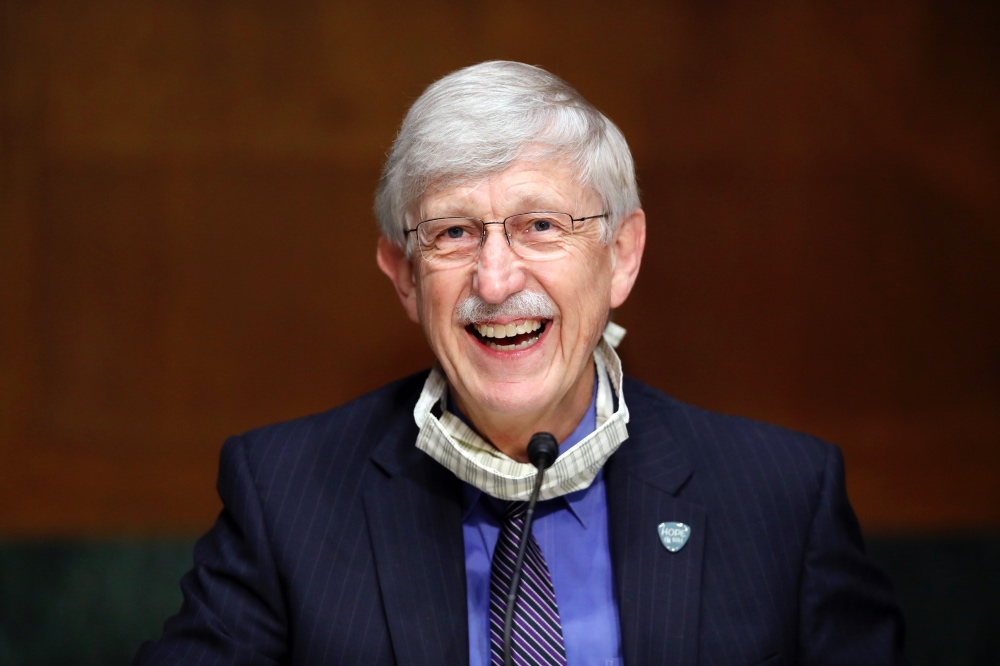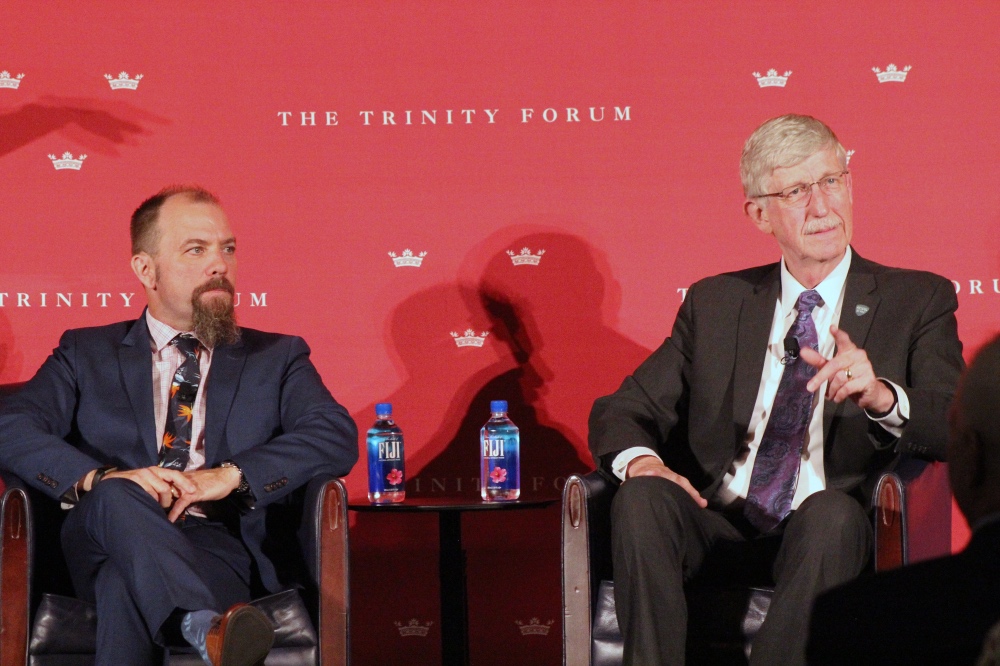Francis Collins, world-renowned geneticist and director of the US National Institutes of Health, is the 2020 recipient of the Templeton Prize. The award, valued at £1.1 million, honours individuals who use scientific advancements to answer the deepest questions related to humanity’s existence and purpose.
Collins is perhaps best known for leading the Human Genome Project, which successfully mapped and sequenced the three billion DNA letters that compose the human genetic instruction book, and for advocating for the holistic integration of Christian faith and science. Today he is the longest-serving director in the history of NIH, the largest supporter of biomedical research in the world.

National Institutes of Health Director Dr Francis Collins speaks during a Senate Health Education Labor and Pensions Committee hearing on new coronavirus tests on Capitol Hill in Washington, DC, on 7th May. PICTURE: AP Photo/Andrew Harnik, Pool/File photo
The prize, established 47 years ago by John Marks Templeton, an American-born British investor, has been awarded to Collins as he and his agency are working at the forefront of developing treatments for the novel coronavirus.
“I’m spending 100 hours a week trying to make sure were bringing every kind of idea, capability and resource toward finding treatment, vaccines and diagnostic tests,” he told Religion News Service after learning that he had won the prize.
The award also comes as religious leaders in the United States have quarreled with politicians and public health experts over the proper balance of faith and science, with some Christian pastors advocating for opening their churches against the recommendations of state officials.
When asked about churches reopening, Collins responded that he deeply values in-person worship. “At the same time,” he said, “I think as Christians we have to have as our number one priority that we are going to care for the sick and the vulnerable. I cannot see, therefore, that it’s justifiable to bring large numbers of people together even in the name of worship, because of the risk it carries.”
Collins said every church gathering should be concerned about transmitting the virus, and that it will remain unsafe to gather in churches until there is “a lot more testing capability” to ensure the virus is no longer present in a congregation.
Collins also expressed concern over the number of Christians who have fallen prey to conspiracy theories surrounding the spread of the coronavirus.
“It is troubling that in our nation that prides itself on being technologically advanced, the current circumstances – particularly on social media – make it so easy for things to spread that are simply not based on facts at all,” he said. “I would particularly urge Christians, who believe in God’s truth in all things, to be sure that they are vetting whatever they are seeing.”
Collins was born to secular parents and once considered himself an atheist who equated “belief in God with intellectual suicide,” according to the Templeton Foundation. At age 27, encounters with medical patients facing death forced him to confront his unbelief. He became a Christian soon after.
His 2006 bestselling book, The Language of God, made the case for the harmony between science and Christianity; the book’s enthusiastic reception led Collins and his wife, genetic counselor Diane Baker, to establish the BioLogos Foundation in 2007 to further support conversations about Christianity and science.
Collins’ approach has been met with pushback from both fundamentalist Christians critical of his belief in evolution and atheists who question Collins’ scientific credibility. Collins acknowledged he occasionally has doubts regarding both science and faith, but said these doubts come from “within,” rather than from “the extremes of the science-faith debate.”
Collins hopes that the Templeton Prize will draw renewed attention to the issue of science and faith and that it might teach young people “it’s entirely appropriate and wonderful to embrace [scientific and Christian] worldviews.”

James KA Smith, left, and Francis Collins participate in “Moving Beyond Conflict: Science and Faith in Harmony” in Washington on 18th June, 2018. PICTURE: Adelle M Banks/RNS
Collins is the most prominent scientist to have won the Templeton Prize, which has been awarded to Mother Teresa, Billy Graham and the Dalai Lama, as well as the late Princeton University physicist Freeman Dyson and the Russian novelist and historian Alexander Solzhenitsyn.
As a professor at the University of Michigan prior to joining NIH, Collins earned the moniker “gene hunter” for developing a technique to locate within DNA the genes responsible for Huntington’s disease, cystic fibrosis and neurofibromatosis, among other diseases. Due in part to these efforts, Collins helped usher in a new era of precision medicine that enables health providers and researchers to customize care for patients.
Under Collins’ direction, NIH has launched several innovative initiatives, including “HEAL: Helping to End Addiction Long Term,” a response to the ongoing opioid crisis, and recently “All of Us,” a research program compiling the health information of one million people in the US into one of the most diverse health databases in history.
PREVIOUSLY: US Christian geneticist Francis Collins ponders promise, peril of biotechnology
In 1993, Collins was appointed the second director of the National Center for Human Genome Research, following James Watson, who discovered the chemical structure of DNA 40 years earlier with British scientist Francis Crick. In 2001, Collins and Craig Venter, a former NIH staffer, simultaneously published their papers on the human genome.
Two decades later, Collins is overseeing efforts to expand testing for COVID-19 based on isolating genetic material from the virus. He said his faith has informed how he has grappled with the realities of the pandemic. He allowed that he has wondered why God allowed the pandemic to happen, but said he does not see the virus as a punishment from God.
“I certainly don’t accept the idea that God is the author of suffering, but I do accept the idea that we as humans can expect it,” he said.
Collins is particularly fond of Psalm 46. “God is our refuge and strength, an ever-present help in trouble,” Collins quoted.
“That makes it pretty clear, there is going to be trouble. But God is there as a very present help and as a refuge and a strength. If we want to look at God’s role in the coronavirus pandemic, that’s where I’d look.”






